| Listing 1 - 10 of 15 | << page >> |
Sort by
|
Book
ISBN: 9781684580262 1684580269 9781684580279 1684580277 Year: 2020 Publisher: Waltham Brandeis University Press
Abstract | Keywords | Export | Availability | Bookmark
 Loading...
Loading...Choose an application
- Reference Manager
- EndNote
- RefWorks (Direct export to RefWorks)
"Contemporary discussions of China tend to focus on politics and economics, giving Chinese culture little if any attention. Why Fiction Matters in Contemporary China offers a corrective, revealing the crucial role that fiction plays in helping contemporary Chinese citizens understand themselves and their nation. Where history fails to address the consequences of man-made and natural atrocities, David Der-wei Wang argues, fiction arises to bear witness to the immemorial and unforeseeable. Beginning by examining President Xi Jinping's call in 2013 to "tell the good China story," Wang illuminates how contemporary Chinese cultural politics have taken a "fictional turn," which can trace its genealogy to early modern times. He does so by addressing a series of discourses by critics within China, including Liang Qichao, Lu Xun, and Shen Congwen, as well as critics from the West such as Arendt, Benjamin, and Deleuze. Wang highlights the variety and vitality of fictional works from China as well as the larger Sinophone world, ranging from science fiction to political allegory, erotic escapade to utopia and dystopia. The result is an insightful account of contemporary China, one that affords countless new insights and avenues for understanding"--
Chinese fiction --- Literature and society --- History and criticism --- History
Book
ISBN: 9780674967915 Year: 2017 Publisher: Cambridge The Belknap Press of Harvard University Press
Abstract | Keywords | Export | Availability | Bookmark
 Loading...
Loading...Choose an application
- Reference Manager
- EndNote
- RefWorks (Direct export to RefWorks)
A New Literary History of Modern China is a collective project that introduces the "long" modern period of Chinese literature from the late seventeenth century to the new millennium. The volume, with roughly 160 essays contributed by 145 authors on a wide spectrum of topics, is intended for readers who are interested in understanding modern China through its literary and cultural dynamics. At the same time, it takes up the challenge of rethinking the conceptual framework and pedagogical assumptions that underlie the extant paradigm of writing and reading literary history. Beyond the familiar canon of literature as representation, the volume seeks to include the tradition of literature as manifestation, on both textual and contextual levels, in a history of modern Chinese literature. In addition to familiar genres, A New Literary History features a diverse lineup of forms, from presidential speeches to pop song lyrics, from photographs to films, and from political treatises to prison house jottings--forms that not only represent the material world, but can also shape it and complete it. By combining both the pointillism of the chronicle and the comprehensiveness of grand recit, this revisionist endeavor introduces the four themes of "worlding" literary China: architectonics of temporalities; dynamics of travel and transculturation; contestation between wen and mediality; and remapping of the literary cartography of modern China.--
Chinese literature --- Literature and society --- History and criticism --- History
Book
Abstract | Keywords | Export | Availability | Bookmark
 Loading...
Loading...Choose an application
- Reference Manager
- EndNote
- RefWorks (Direct export to RefWorks)
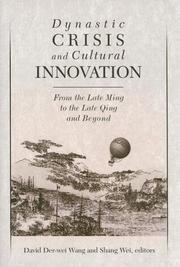
ISBN: 9780674017818 0674017811 1684174147 9781684174140 Year: 2005 Volume: 249 Publisher: Boston Leiden;Boston Harvard University Asia Center BRILL
Abstract | Keywords | Export | Availability | Bookmark
 Loading...
Loading...Choose an application
- Reference Manager
- EndNote
- RefWorks (Direct export to RefWorks)
Chinese literature --- Littérature chinoise --- History and criticism. --- 1368-1644 (Dynastie des Ming) --- Histoire et critique --- 1644-1912 (Dynastie mandchoue) --- S16/0160 --- S16/0195 --- China: Literature and theatrical art--General works on traditional literature --- China: Literature and theatrical art--Thematic studies --- Littérature chinoise --- History and criticism
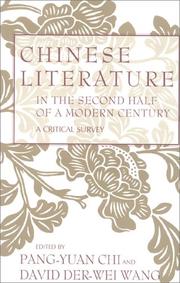
ISBN: 0253337100 0253108365 Year: 2000 Publisher: Bloomington Indiana university press
Abstract | Keywords | Export | Availability | Bookmark
 Loading...
Loading...Choose an application
- Reference Manager
- EndNote
- RefWorks (Direct export to RefWorks)
S16/0170 --- S26/0450 --- S27/0450 --- S16/0190 --- S16/0195 --- S16/0100 --- Chinese literature --- -China: Literature and theatrical art--General works on modern literature --- Taiwan--Literature --- Hong Kong--Literature --- China: Literature and theatrical art--Literary criticism --- China: Literature and theatrical art--Thematic studies --- China: Literature and theatrical art--Bibliographies, dictionaries, yearbooks and collections --- History and criticism --- -History and criticism
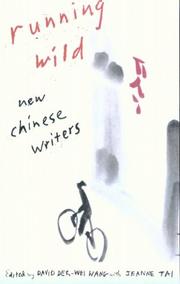
ISBN: 0231096488 0231096496 Year: 1994 Publisher: New York (N.Y.): Columbia university press
Abstract | Keywords | Export | Availability | Bookmark
 Loading...
Loading...Choose an application
- Reference Manager
- EndNote
- RefWorks (Direct export to RefWorks)
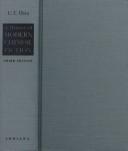
ISBN: 0253334772 Year: 1999 Publisher: New Haven (Conn.): Yale university
Abstract | Keywords | Export | Availability | Bookmark
 Loading...
Loading...Choose an application
- Reference Manager
- EndNote
- RefWorks (Direct export to RefWorks)
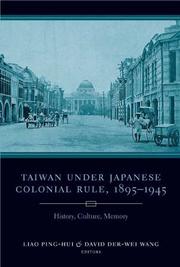
ISBN: 0231137982 0231510810 Year: 2006 Publisher: New York Columbia university press
Abstract | Keywords | Export | Availability | Bookmark
 Loading...
Loading...Choose an application
- Reference Manager
- EndNote
- RefWorks (Direct export to RefWorks)
Taiwan --- Civilization --- Japanese influences.
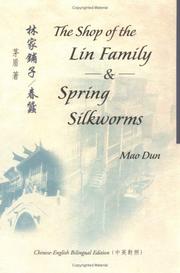
ISBN: 9789629960452 Year: 2004 Publisher: Hong Kong : Chinese University Press,
Abstract | Keywords | Export | Availability | Bookmark
 Loading...
Loading...Choose an application
- Reference Manager
- EndNote
- RefWorks (Direct export to RefWorks)
Book
ISBN: 9780231188401 Year: 2018 Publisher: New York Columbia University Press
Abstract | Keywords | Export | Availability | Bookmark
 Loading...
Loading...Choose an application
- Reference Manager
- EndNote
- RefWorks (Direct export to RefWorks)
" ... In this eloquent autobiography, the noted scholar, writer, and teacher Chi Pang-yuan recounts her youth in mainland China and adulthood in Taiwan. Chi's remarkable life, told in rich and striking detail, humanizes the eventful and turbulent times in which she lived. The Great Flowing River begins as a coming-of-age story set against the backdrop of China's war with Japan. Chi depicts her childhood in pre-occupation Manchuria and gives an eyewitness account of life in China during the war with Japan. She tells the tale of her youthful romance with a dashing pilot that ends tragically when he is shot down in the last days of the war. The book describes the deepening political divide in China and her choice to take a job in Taiwan, where she would remain after the Communist victory. Chi details her growth as an educator, scholar, and promoter of Chinese literature in translation and her realization that despite her roots in China, she has found a home in Taiwan, giving an immersive account of the postwar history of Taiwan from a mainlander's perspective ..."--Jacket.
Sino-Japanese War, 1937-1945 --- Authors, Chinese --- Qi, Bangyuan. --- Civil War (China : 1945-1949) --- Sino-Japanese War (1937-1945) --- China --- Taiwan --- History
| Listing 1 - 10 of 15 | << page >> |
Sort by
|

 Search
Search Feedback
Feedback About UniCat
About UniCat  Help
Help News
News